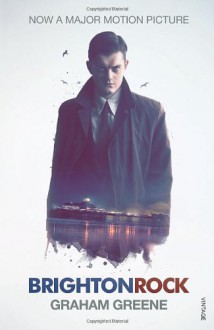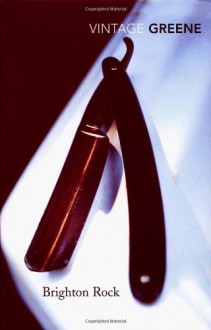

Seriously, I am done with Greene's "gritty thrillers".
Years ago, I watched Brighton Rock and didn't enjoy it. Now, having read the book as the (hopefully) last of the "early" works, I have the same impression. Nice, but so not keeping me interested...at all.
And, oh dear, there is some clunky writing in this one.
NEXT!

I don't know if it's an English thing, but everyone seemed to have read this book I had never even heard of. Well, now I've done it too, and it's my first Graham Greene. Score!
One thing that I like about Brighton Rock is its excellent sense of place. Graham Greene draws a very vivid image of Brighton that is so different from the Brighton of today; and for someone who knows the place, but not the place in that time, it leaves an eerie feeling, like when you realise that your childhood memories are all wrong. An important part of Greene's Brighton are the characters (no shit, Sherlock), who belong to this bizarre different time as much as the setting in which they operate. And they are real, these are none of your stuffy folk with inspired musings - these guys drink pints, eat out of tins, ask strangers for spare change. Their enviroment contains plastic flowers in small cafes serving sausage rolls, coin operated machines that tell your fortune, racecourses where punters are hunting for a tip-off. This environment does not come in a stretching landscape view, with the observer's commentary and interesting trivia, it just is there, somehow known and not described, and the characters inhabit it.
Speech is another good one. 'A pony' means 25 quid, a 'polony' is a girl, and I had no idea what the hell Brighton Rock was until I finished the book and went searching on the internet (then I said 'oh THAT'). It's not just the vocabulary. Some exchanges are an awesome example of banter:
"'Always tell a sporting woman. Ask you round the corner to split a bottle of fizz if those beggars hadn't taken the last fiver I cam out with. Wanted to go and lay a couple. Have to go home first. Odds'll go down while I'm doing it. You'll see. You couldn't oblige me, I suppose? Two quid, Charlie Moyne'
'Here', Ida said, 'you can have a quid; now run along'"
I think you might be kind of convinced by now. The only thing I have to add was that the book's take on morality is very versatile - you can read it in whichever way suits you. It will be refreshing if your moral code exists independently from your society's social values/the law, but either way there's plenty to challenge your beliefs and to test your boundaries. Some good material for lengthy discussions with yourself.
That is all; I am knackered after work and can say no more. It's a good read.
 This is a dark story set in 1930's Brighton. Greene's main character is a small time gang member who seeks to revenge the death of his previous boss by the main gang in Brighton. He kills Hale, an informer for the other gang, and the rest of the story he sets about trying to give himself a watertight alibi by eliminating people who know and by forcing Rose, another girl who is aware of what he did, to marry him. At that point a wife could not give evidence against a husband.
This is a dark story set in 1930's Brighton. Greene's main character is a small time gang member who seeks to revenge the death of his previous boss by the main gang in Brighton. He kills Hale, an informer for the other gang, and the rest of the story he sets about trying to give himself a watertight alibi by eliminating people who know and by forcing Rose, another girl who is aware of what he did, to marry him. At that point a wife could not give evidence against a husband.